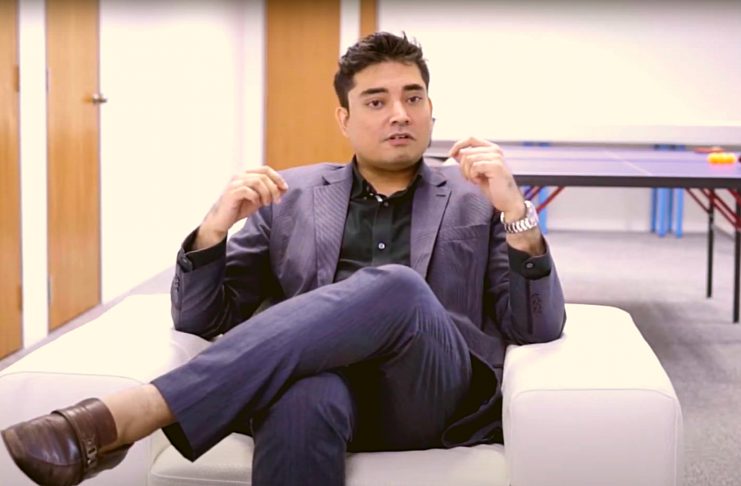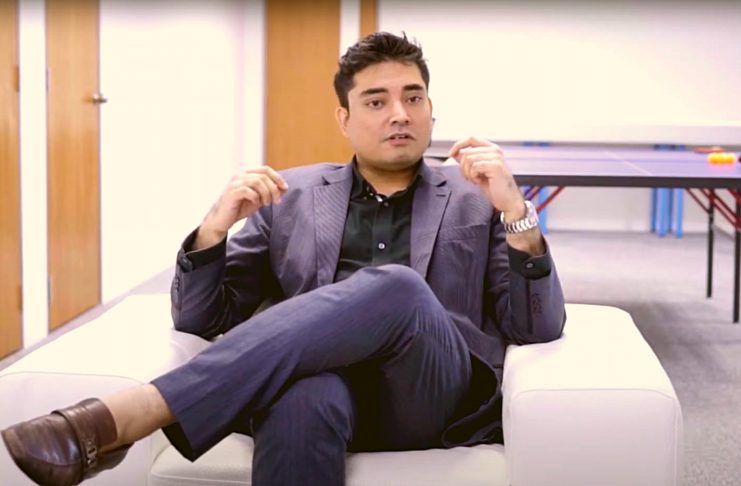
Unlocking the Secrets to a Perfect Memory: A Conversation with Sancy Suraj, Memory Coach and Trainer
In today’s world, we are constantly bombarded with information and stimuli that can make it challenging to remember everything we need to. But what if there was a way to unlock the secrets to a perfect memory? Enter Sancy Suraj, a memory coach and trainer who has achieved several memory speed recall records and holds the Singapore record for reciting the most digits of pi. In a conversation with Sancy Suraj, we delved into the world of memory training and learned more about his unique approach.
What inspired you to become a memory coach and trainer?

I am Sancy Suraj, a memory coach and trainer, and I have always been passionate about pushing the limits of the human mind. My journey as a memory coach began when I discovered the power of memory training and how it can transform an individual’s life. My own experience of improving my memory led me to become a trainer and coach to help others achieve similar results.
Throughout my childhood, I was always intrigued by the mind’s incredible capacity to store and recall information. As I grew older, I realized that memory plays a crucial role in almost every aspect of our lives, from learning and retaining knowledge to building relationships and achieving success. I wanted to explore this further and began experimenting with different memory techniques to see how I could improve my own memory.
As I delved deeper into the world of memory training, I was amazed at the potential that it held. I began to see that anyone, regardless of their age or background, could develop a powerful memory and enhance their cognitive abilities. I was eager to share this knowledge with others, and that’s when I decided to become a memory coach and trainer.
My goal as a memory coach is to help people unlock the full potential of their memory and achieve their goals. I believe that memory training is not just about memorizing information but also about building a stronger and more resilient brain. It’s an incredible feeling to see my clients break their own personal records and achieve feats they never thought possible. And that’s what continues to inspire me to do what I do every day.
What are some common misconceptions people have about memory, and how do you help them overcome these misconceptions?
As a memory coach and trainer, I often encounter people with common misconceptions about memory. One of the most common misconceptions is that memory is an innate ability that cannot be improved. Many people believe that either you have a good memory or you don’t, and there’s nothing you can do to change that. However, this is far from the truth. Memory is a skill that can be trained and improved through practice and the right techniques.
Another common misconception is that memory techniques are difficult to learn and time-consuming. People often believe that using memory techniques requires a lot of effort and time, which makes them hesitant to try it. However, the truth is that memory techniques are simple and easy to learn. With the right guidance and practice, anyone can master these techniques and start seeing improvements in their memory.
Lastly, some people believe that memory techniques are only useful for memorizing lists or numbers. While memory techniques are certainly useful for these tasks, they can be applied to any type of information. Whether you’re studying for an exam, preparing for a presentation, or trying to remember people’s names, memory techniques can be incredibly effective.
As a memory coach, it’s my job to help people overcome these misconceptions and understand the true potential of their memory. I do this by providing them with a clear understanding of how memory works and the various techniques that can be used to improve it. I also help them develop a personalized training plan that is tailored to their specific needs and goals. With the right guidance and support, anyone can unlock the secrets to a perfect memory and achieve incredible feats of recall.
What are some of the most effective memory techniques that you teach your clients, and how do they work?
As a memory coach and trainer, I teach my clients a wide variety of memory techniques that can be used to remember anything from names and faces to long strings of numbers or complicated information. One of the most effective techniques that I teach is called the Memory Palace, which involves visualizing information in a familiar location, such as a house or a street. By placing each piece of information in a specific location in the Memory Palace, you can easily recall it later by mentally walking through the location and visualizing each piece of information.
Another effective technique is called the Link Method, which involves creating a visual association between two pieces of information. For example, to remember the name “John Smith,” you might visualize a picture of a toilet (for the “John” part) and a picture of a blacksmith (for the “Smith” part). By linking these two images together in your mind, you can easily recall the name later.
I also teach my clients the use of mnemonics, which involves creating a memorable phrase or acronym to remember a list of information. For example, to remember the colors of the rainbow in order, you might use the phrase “Richard Of York Gave Battle In Vain,” which stands for Red, Orange, Yellow, Green, Blue, Indigo, and Violet.
Finally, I often teach my clients the importance of repetition and practice. By reviewing information regularly and using these memory techniques consistently, anyone can improve their memory and recall abilities.
Overall, these memory techniques work by utilizing the power of visualization and association to create strong, memorable connections between different pieces of information. With practice and guidance, anyone can learn to use these techniques effectively and achieve incredible feats of recall.
“Memory is a powerful tool, and with the right techniques, we can unlock its full potential. The Memory Palace, Link Method, and mnemonics are like keys that open the doors to a world of information, waiting to be remembered. With repetition and practice, we can turn forgetfulness into a thing of the past and become masters of our own memories.”
How do you customize your approach to meet the unique needs and goals of each of your clients?
As a memory coach and trainer, I understand that each of my clients has unique needs, goals, and learning styles. Therefore, I always begin by assessing their current level of memory ability and identifying their specific areas of weakness and strengths. This assessment allows me to develop a customized training plan that meets their individual needs and goals.
Once I have a good understanding of their abilities and goals, I then work with each client to develop a personalized approach that best suits their learning style. Some clients may respond well to visual aids, while others may prefer hands-on activities or verbal instructions. By customizing my approach to each client’s learning style, I can help them achieve the best possible results in the shortest amount of time.
I also take into consideration my clients’ specific memory needs and goals. For example, a student who needs to memorize information for an exam may require a different approach than a business executive who needs to recall names and faces of clients. By understanding their specific memory needs and goals, I can tailor my approach and techniques to help them achieve their desired outcomes.
Finally, I regularly check in with my clients to assess their progress and adjust my approach as needed. This allows me to ensure that my clients are making progress towards their goals and that their customized approach is effective for them.
Overall, my approach to memory coaching and training is highly personalized and tailored to meet the unique needs and goals of each client. By doing so, I can help them achieve their desired outcomes and unlock the full potential of their memory.
Can you share a success story of someone you’ve worked with and how memory training impacted their life?
One of my most memorable success stories is about a student named John, who had been struggling to memorize information for his exams. John had a hard time recalling the details of his course materials, and he often found himself frustrated and overwhelmed by the amount of information he needed to retain. As a result, his grades suffered, and he was at risk of failing his courses.
After working with John for several weeks, we were able to identify his learning style and develop a personalized memory training plan that focused on techniques that suited his strengths. We worked on visualizing information, creating associations, and using mnemonic devices. Over time, John’s confidence and memory abilities improved significantly, and he began to see a noticeable improvement in his grades.
By the end of the semester, John had achieved some of his best academic results ever, and he was thrilled to have been able to apply his newfound memory skills to his coursework. He even mentioned that he had started to use his new memory techniques in his personal life, such as memorizing people’s names and phone numbers, and he found that it had greatly improved his communication skills.
John’s success story is just one example of how memory training can have a positive impact on a person’s life. By improving their memory abilities, my clients are able to achieve their goals, whether it be academic success or career advancement. It’s incredibly rewarding to see my clients unlock the full potential of their memory, and I am grateful to be able to help them along the way.
“Memory training is not just about memorizing information, it’s about unlocking the full potential of your brain and achieving your goals. John’s success story is a testament to the power of personalized memory techniques and the impact it can have on one’s academic, personal, and professional life.”
Sancy Suraj has been coaching individuals on how to improve their memory for several years now. When asked about the common misconceptions people have about memory, he highlighted the belief that memory is innate and can’t be improved upon. However, he shared that memory is like a muscle, and with the right techniques and practice, anyone can improve their memory skills.
One of the most effective memory techniques that Sancy Suraj teaches his clients is the Memory Palace technique. This technique involves associating information with specific locations in a familiar place, such as a childhood home, and then visualizing the information in those locations. He also customizes his approach for each client based on their unique needs and goals. Sancy Suraj shared a success story of a client who was struggling to remember important details for a job interview. After working with Sancy Suraj, the client was able to remember all the key points and ultimately landed the job.
As a coach and trainer, Sancy Suraj keeps himself motivated and continues to develop his own memory skills and knowledge by attending workshops and seminars, practicing new techniques, and participating in memory competitions.
How do you keep yourself motivated and continue to develop your own memory skills and knowledge as a coach and trainer?

As a memory coach and trainer, I am constantly learning and growing, both as a professional and as a person. To keep myself motivated and to continue developing my own memory skills and knowledge, I engage in a variety of activities that challenge and inspire me.
One of the ways I stay motivated is by attending seminars, workshops, and conferences related to memory training and other related topics. These events provide an opportunity to network with other professionals in the field, as well as to learn about the latest research and techniques. I also read extensively about memory training, neuroscience, and other related subjects, staying up-to-date on the latest developments and breakthroughs.
Another way I keep myself motivated is by practicing what I preach. I regularly use memory techniques in my own life, whether it be to memorize a speech or presentation, learn a new language, or remember important details. By applying these techniques myself, I not only continue to develop my own memory skills, but I also gain a deeper understanding of how they work and how they can be applied in various situations.
Finally, I am motivated by the success stories of my clients. Seeing the positive impact that my coaching has on their lives is incredibly rewarding and inspiring. It motivates me to continue to improve my skills as a memory coach and trainer, so that I can help even more people unlock the full potential of their memory.
Overall, staying motivated and continuing to develop my own memory skills and knowledge is essential to my work as a memory coach and trainer. By engaging in a variety of activities that challenge and inspire me, I am able to stay at the top of my game and provide the best possible service to my clients.
“Continuous learning and self-application are the twin engines that drive the success of a memory coach and trainer, fueled by the passion to unlock the full potential of the human memory and the motivation to witness the positive impact of their coaching on the lives of their clients.”
In conclusion, Sancy Suraj’s approach to memory training offers a unique and effective way to improve memory skills. By dispelling common misconceptions, customizing his approach, and using effective memory techniques, he has helped many individuals improve their memory and achieve their goals. As we navigate through our information-rich world, it’s clear that memory training can offer significant benefits for personal and professional success.